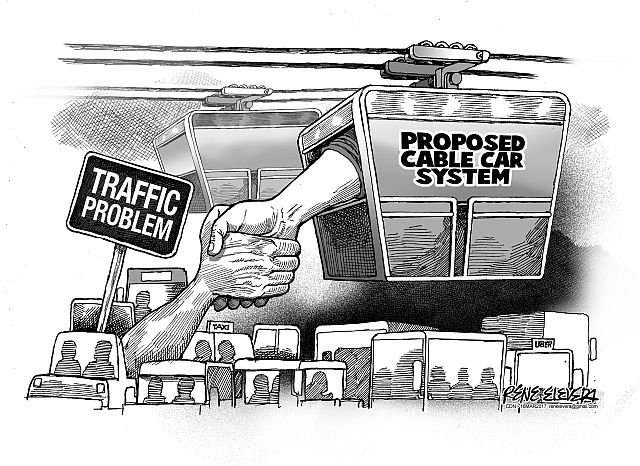
A proposal for a cable car system for Metro Cebu may seem yet another one of those “pie in the sky” pipe dreams being floated by some local officials eager to show off their technical knowledge to constituents without bothering to explain how it can be done given the existing government bureaucracy and the difficulties of securing funds from domestic and international financial institutions.
But this proposal was floated by GMR-Megawide, the consortium now operating the Mactan-Cebu International Airport (MCIA), and given Cebu’s local connection to the Palace, this project may be worth more than just a second look.
In an Inquirer report, GMR-Megawide Cebu Airport Corp. (GMCAC) Chief Executive Adviser Andrew Harisson told reporters that the cable car system can be initially operational on Mactan Island and expand to mainland Cebu.
If we are not mistaken, the cable car system had been operational in San Francisco California, which is used to ferry tourists to some of that city’s landmarks.
That feature is what attracted and convinced Cebu’s top business leaders to support the cable car system since it can be used to show its passengers some of Cebu’s tourist attractions and landmarks.
Harisson said the proposed cable car system project would have 8 to 10 stops including Mactan’s resorts and the international airport. Any transport system that can fetch commuters to and from the airport is a welcome development.
What makes the cable car system attractive, he said, is the minimal problems to be encountered in road right-of-way acquisitions between government and private landowners or families who have settled in the areas.
Road right-of-way had been among the most difficult problems to be encountered by government and had delayed the implementation of the Bus Rapid Transit (BRT) system.
What makes the cable car system attractive, Harisson said, is that it is cheaper to build and set up than the railway or train system otherwise known in this country as the Light Railway Transit (LRT).
While President Rodrigo Duterte had been favorable to setting up railway systems in the country, he may be convinced by Adelino Sitoy, former Cordova mayor and now presidential liaison officer to Congress, to pursue a different tack in Metro Cebu.
It wouldn’t hurt too if Presidential Assistant for the Visayas Michael Dino also throws his support to the cable car system project which may prove more flexible than the LRT, which has a fixed route, is more expensive to build and whose construction may result in uprooting existing communities and landmarks and result in elevated train tracks that, like flyovers, block the commuters’ view of the city skyline.
This project can effectively complement the BRT, and if so, it should be supported by local and national governments if only to further ease the worsening traffic congestion in Metro Cebu.

